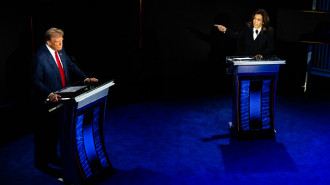Bahrain designates anti-government protesters as 'terror group'
The Lebanese Hizballah movement headed the government list with groups such as al-Qaeda and its branches in Yemen and North Africa, as well as al-Nusra Front in Syria and the Islamic State group [IS].
Also on the list were al-Ashtar Brigades and Resistance Brigades, as well as the February 14 Coalition - all believed to be Shia majority Bahraini groups that have protested against the monarchy.
The government accuses these groups of carrying out violent attacks against security forces.
Bahrain has been persistenly accused of discriminating against its Shia-majority population since the 2011 uprising began in Pearl Square.
International human rights organisations have accused the tiny but strategic Gulf state of clamping down on activists that have called for a full constitutional monarchy with an elected prime minister in the kingdom.
Last week, US Secretary of State John Kerry told Bahraini officials that respect for human rights was "essential" on his first official visit to the country since holding the top diplomatic job.
The mention of Hizballah on the list comes as no surprise for the GCC member.
Last month, Gulf Arab states led by Saudi Arabia blacklisted Hizballah, the leading force in Lebanon's governing bloc, as a "terrorist organisation".
The move was repeated by the Arab League less than 24 hours after Mubarak-era Egyptian foreign minister Ahmed Abdul Gheit was appointed to lead the Cairo-based organisation.
The move follows stern sanctions against Lebanon in what is an escalating situation between Saudi Arabia and Hizballah's main backer, Iran.
Saudi Arabia halted a $3 billion programme of military aid to Lebanon to protest what it said was "the stranglehold of Hizballah on the state".
It has also urged its citizens to leave Lebanon and avoid travelling there.
Bahrain, Qatar and Kuwait followed with similar travel advisories, while the United Arab Emirates banned its nationals from travel to Lebanon.
The moves come against the backdrop of increased tensions with Tehran this year after demonstrators stormed the kingdom's missions in Iran following Saudi Arabia's execution of a Shia cleric, prompting Riyadh to cut diplomatic ties.

![Palestinians mourned the victims of an Israeli strike on Deir al-Balah [Getty]](/sites/default/files/styles/image_684x385/public/2024-11/GettyImages-2182362043.jpg?h=199d8c1f&itok=xSHZFbmc)


![The law could be enforced against teachers without prior notice [Getty]](/sites/default/files/styles/image_684x385/public/2178740715.jpeg?h=a5f2f23a&itok=hnqrCS4x)
 Follow the Middle East's top stories in English at The New Arab on Google News
Follow the Middle East's top stories in English at The New Arab on Google News

![Voters in Michigan [Getty]](/sites/default/files/styles/image_330x185/public/2182490468.jpeg?h=a5f2f23a&itok=XMi_sWGX)
